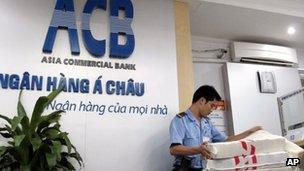Vietnam arrests second top official in ACB bank case
- Published

Vietnam's central bank has been infusing ACB with cash to reassure depositors
A second top executive in Vietnam has been arrested in a case that has led to a plunge in bank shares and a run on deposits, state-run media report.
Ly Xuan Hai, former chief of the Asia Commercial Bank, was arrested on Thursday for breaching "state regulations on economic management", says the Vietnam News Agency.
He had resigned after bank co-founder Nguyen Duc Kien was arrested on Monday.
Vietnam has been pumping money into the bank to reassure depositors.
Mr Kien, a well-known entrepreneur with close government links and one of the country's richest businessmen, co-founded ACB in the 1990s. He was arrested in Hanoi on suspicion of "economic violations".
His arrest triggered a slide in ACB shares. It also caused a drop in the country's stock exchange up until Thursday.
Panicked depositors have been withdrawing millions of dollars from the bank.
ACB said on Tuesday that Mr Kien was not involved in the day-to-day operations of the bank and the arrest would not impact its business.
Mr Hai has been accused of "intentional wrongdoings that violated state regulations on economic management, causing serious consequences", VNA says. No other details were provided.
Mr Hai's arrest did not come as a surprise, as state-run media had already reported on it in the last few days before taking these reports offline, says Nga Pham of the BBC's Vietnamese service.
This unusual practice shows that the government is keen to prevent further panic spreading through the banking system, she said.
While government institutions are saying that deposit withdrawals remain within safe margins, the public are asking for more transparency as worries over the economy increase, she adds.
Mr Hai, 47, who has doctorates in mathematics and physics, joined the bank in 1996, reports say.
The bank run has put pressure on the Vietnamese dong and led to an increase in the price of gold - traditionally seen as a safe-haven investment at times of economic instability.
ACB also faced a run on its deposits in 2003 after rumours - later proved false - spread about the arrest of one of its executives at the time.
- Published23 August 2012
- Published21 August 2012
- Published13 July 2012
- Published12 July 2012